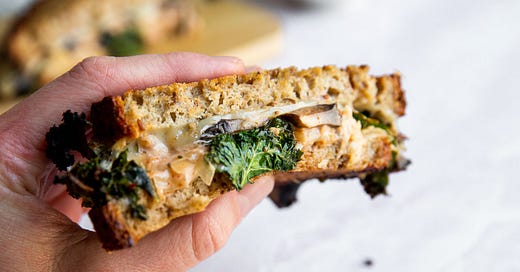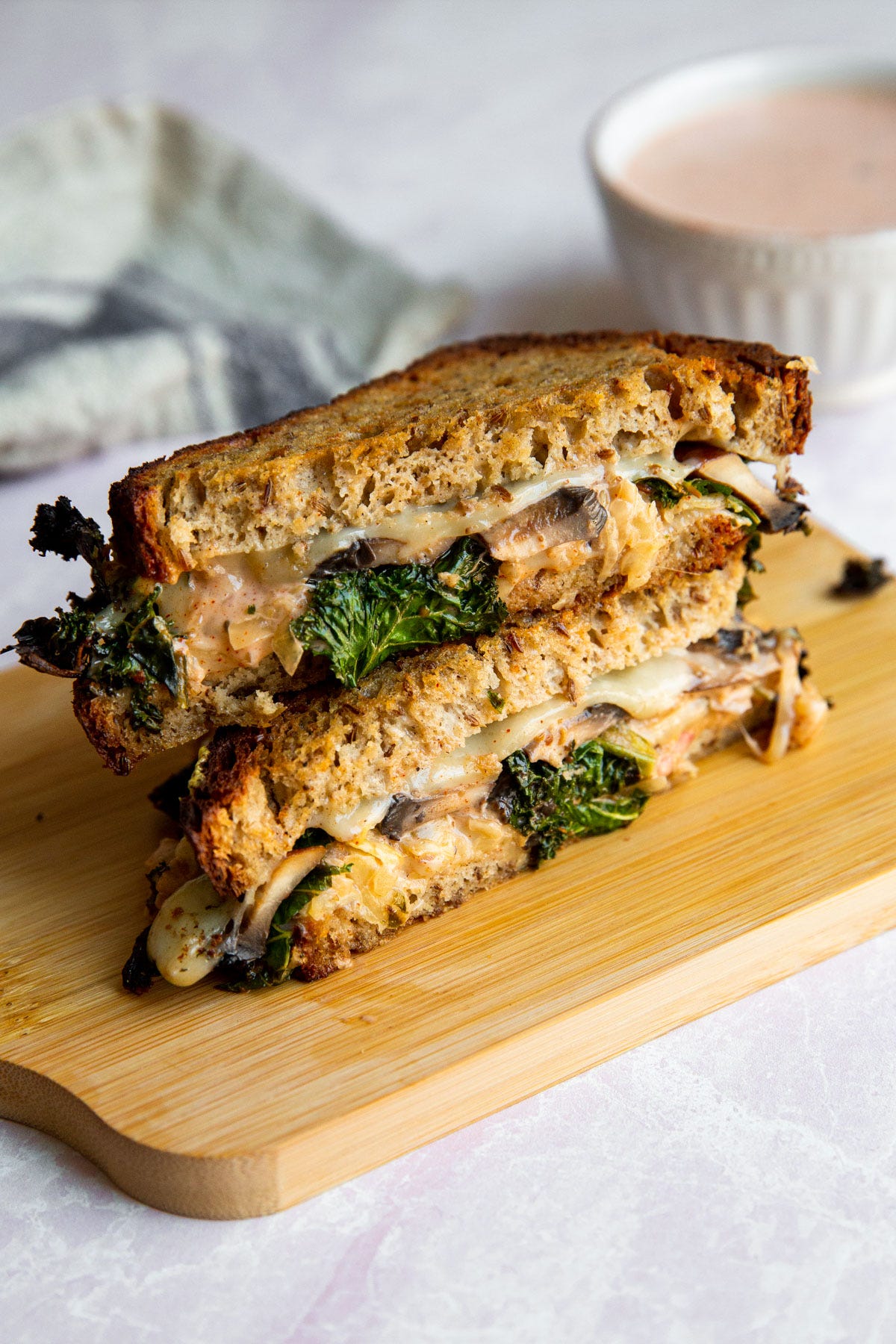This week, as a follow-up to my podcast episode on Tuesday, I want to talk about the ways in which we’re conditioned around food. Also, I’m sharing a new recipe for Mushroom and Kale Reubens (omg), which get made in the oven and which are everything my sandwich dreams are made of. This recipe is for paid subscribers (free subscribers get access to all of the essays and 1-2 of the recipes per month, but paid subscribers have access to all the recipes, along with the whole archive, threads and other fun perks that I’m dreaming up). Thank you, thank you, thank you to all of you who have gone paid. Just a few dollars a month goes a very long way and makes this work possible. You can also support this work by sharing it to your friends or on social media, if it feels aligned.
Conditioning around food
More than almost anything else in our lives, we’re deeply conditioned around food. We’re told from so many different angles what we should eat, when we should eat, what foods are good, and what foods are bad. This comes from our cultures, our families, our religions, the media, influencers, food brands, you name it. Everybody’s trying to tell us what to eat.
Remember the “got milk” campaign that insisted that milk needed to be part of a healthy diet (regardless of dairy allergies or intolerances), or the low-fat years when fat became vilified (you can hear how that message negatively impacted my beliefs about fat and my body in my podcast). Food brands want to convince us their products are “healthy” while the media latches on to studies that are often funded by those food brands. Diet gurus tell us that their protocols will make us look and feel great. These messages find us everywhere—on social media, in television commercials, on food packaging, in newspaper articles, in magazine spreads and on billboards.
Conditioning around our bodies
Even more, social, political and religious structures govern how we think about our bodies, and this in turn influences how we think about food. In Dr. Hillary McBride’s book, The Wisdom of Your Body, which I referenced last week, she describes how systems of patriarchy, colonialism, racism and oppression reduce our bodies to objects, making it easier for power structures to control people based on their gender (or chosen gender), skin color and body shape. Certain religions teach that bodies are shameful, and that our sexual preferences are at best animalistic or at worse, sinful. Diet culture, which argues that our worth stems from our appearance, has profited enormously from this disconnect to our bodies, becoming a multi-billion dollar industry.
How can we learn to feed ourselves intuitively if we’re disconnected to our bodies, or if we believe that our bodies are unworthy or filled with shame?
We therefore seek external guidance when it comes to choosing the foods we eat. While guidance isn’t always a bad thing (and is certainly necessary for children), this can end up being very confusing (so many opposing messages!) and even detrimental to our physical and emotional well being. Perhaps we follow a diet or plan that doesn’t suit our individual physical needs, or we feel fearful or guilty that we’re doing it all wrong.
Regaining our sovereignty
So how to we crawl out from this web of conditioning in order to tune into ourselves? Remember, we are all unique, and we all have unique needs when it comes to the foods that best serve our bodies. While there’s not a magic (or easy) answer, we can start by paying attention. If we can’t see the web in the first place, we can’t escape it. In simply recognizing that we’re conditioned around food, we can begin, strand by strand, to untangle ourselves, to see how certain beliefs that we have around food have come from external sources seeking power, profit or control.
I need to acknowledge that I’m a heterosexual person in a thin, white body, and this provides me with an immense amount of privilege. I will never know the experience of being in a body with dark skin or of a different build or different sexual orientation. My experience of my body, while influenced deeply by systems of patriarchy and capitalism, has never been subject to oppression. This is important to recognize. While my mission through this work is to help us individually heal our relationship to food and gain sovereignty as eaters, it’s also to support bodies that are being oppressed or marginalized by racism, agism, homophobia, body type and other prejudices. We need to do this together.
Let’s start the conversation
Perhaps by sharing our own stories we can start to shed light on the ways we’ve internalized messages about food and our bodies that don’t serve us. This is a safe space, and if you’d like to share a belief below that you want to let go of, or that you’ve already let go of, I invite you to do so. I have two:
1. My body is shameful. As a young person I felt at once ashamed of my feminine body and simultaneously ashamed that my straight and narrow body was never feminine enough. No longer. My body is my sacred container, and I honor her.
2. You shouldn’t eat before bed. For years I avoided eating before bed because I was told it was terrible for digestion, and I would make myself eat first thing in the morning because I was told breakfast was essential. It wasn’t until just a couple of years ago that I started honoring the hunger I feel late at night. I sleep far better with food in my belly, and I need time in the morning before I can eat. This is just the way my body works best (no matter what anybody else thinks)!
Finally, one last quote from McBride. She states:
“Regardless of our circumstances or what we have been told about bodies, remembering and reuniting with our bodily selves is a radical act to undo our need to earn our worth, helping us wake up to the fact that there is something sacred right here, in this moment, always present and always available.”
Food can be a tool to help us reconnect.
Mushroom and Kale Reubens
I love a good reuben, but who says that it has to be made with meat? In the spirit of letting go of conventional thinking, I’m introducing these vegetarian reubens, which swap out corned beef for roasted kale and portobello mushrooms.
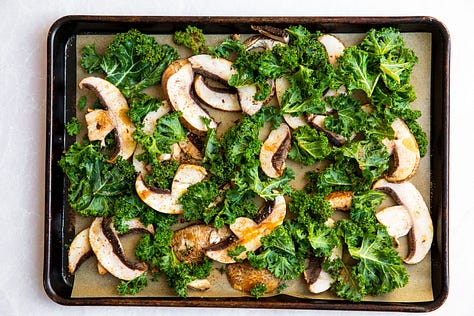
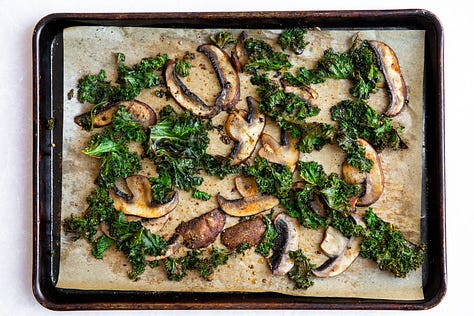

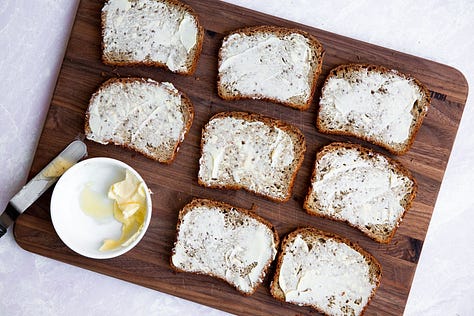
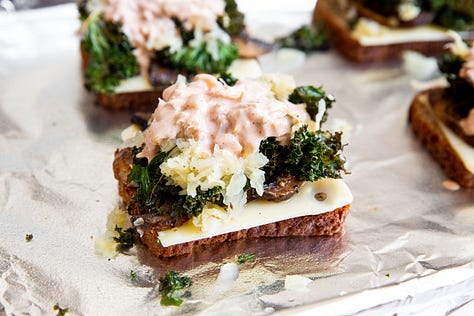

The vegetables are seasoned with spices that typically go into pastrami, giving them a rich, complex flavor. A Russian dressing-inspired sauce (which you can make with mayonnaise or Greek yogurt) ties everything together (you’ll definitely want to serve some on the side for dipping!).
Instead of cooking the sandwiches on the stovetop I pop them under the broiler, since it makes clean-up a breeze, although you can certainly cook them on the stovetop instead. Check out this reel to see how they come together.
Keep reading with a 7-day free trial
Subscribe to Mind, Body, Spirit, FOOD to keep reading this post and get 7 days of free access to the full post archives.


